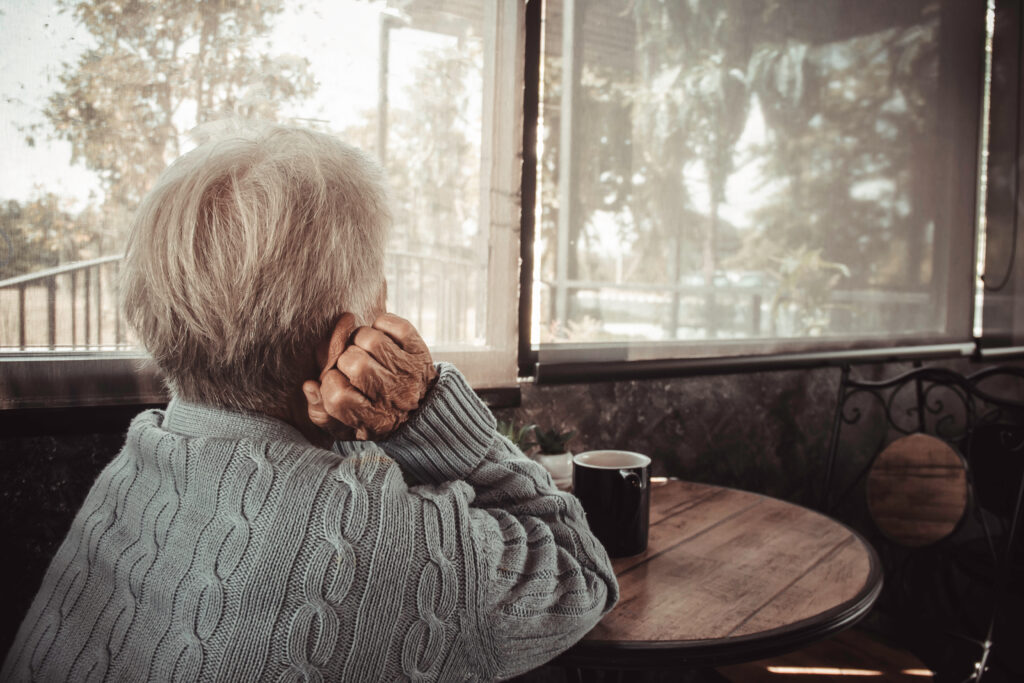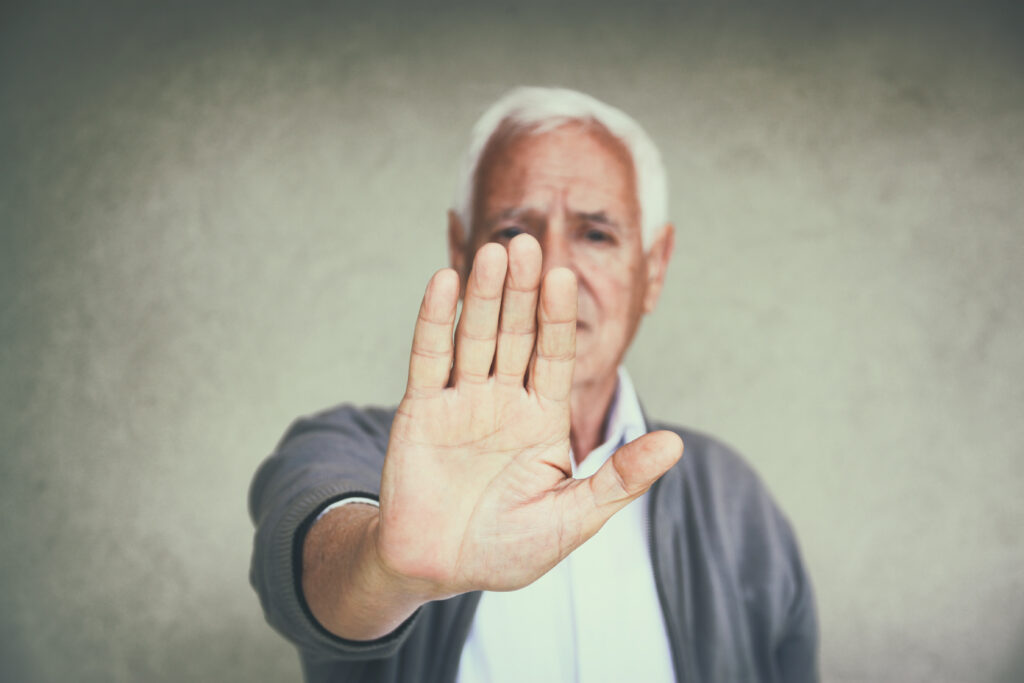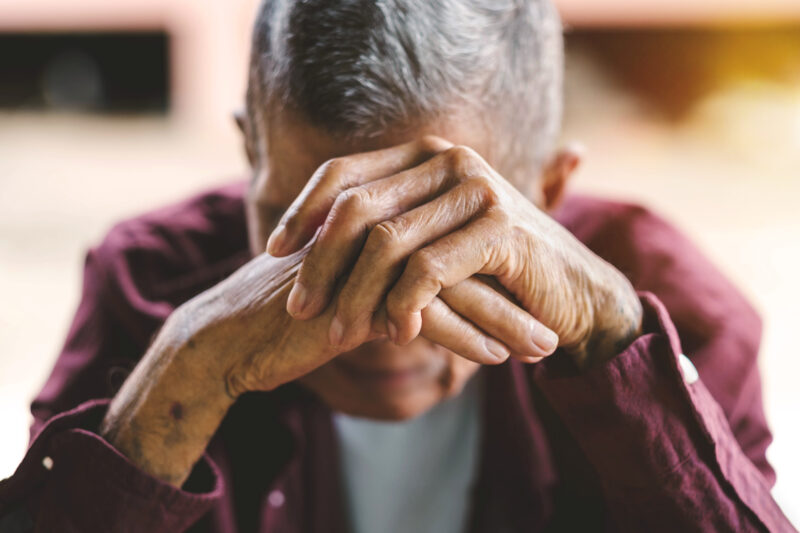It’s an unfortunate reality, but approximately one in six Americans age 60 years and older experience abuse in senior care services or facilities. And long-term care facilities and nursing homes around the world reveal higher abuse rates, with the World Health Organization reporting that two in three staff members admit to mistreating residents.
One of the crucial responsibilities of family caregivers is to spot and prevent elder abuse. But to do this, you need to first know how to identify indications of abuse.

Types of elder abuse and warning signs
Learn about the various forms of abuse that frequently occur in senior care services or communities and how to detect the warning signs.
1. Physical elder abuse
Physical elder abuse occurs when someone is physically violent or aggressive toward a senior, leading to injuries that may be minor or major. In either case, the abuse is inexcusable. Physical abuse often comes in the form of hitting, slapping, punching, pushing or restraining a senior resident. It may exacerbate existing illnesses or other physical conditions, and can lead to long-lasting effects. Significant indications of physical abuse are visible burns, bruises, sprains, tooth loss, dislocated joints or broken bones.
2. Emotional elder abuse
Emotional elder abuse may include verbal harassment like yelling, manipulating or psychological torment, or possibly blaming a senior.
If you notice your loved one feels isolated and manifests the following behaviors below, they may be experiencing emotional abuse:
- Feeling afraid of their caregiver
- Appearing more shy than usual
- Depression or withdrawal
- Low self-esteem
- Avoiding eye contact
- Detaching from friends and families
3. Elderly sexual assault
Sexual abuse occurs when a caregiver forces an elderly to involve in sexual acts. Women and people with dementia are the common victims of this type of abuse. Sexual abuse includes:
- Unwanted touching
- Sexualized kissing and fondling
- Sexual photography
- Rape
- Forcing the senior to watch pornography
- Forced nudity
Signs of elder sexual abuse in facilities providing senior care services include:
- Bruises in thighs, breasts, or genital or perianal areas
- Vaginal bleeding
- Depression or withdrawal
- Intense fear around their abuser
- Agitation and sudden shift in mood
- Torn or blood-stained clothes
4. Financial exploitation
Individuals receiving advanced dementia care are prime targets for financial abuse. If not detected immediately, financial exploitation may result in an enormous loss of your loved one’s assets and retirement savings.
Community employees commit financial abuse by doing the following:
- Stealing cash, jewelry and valuable goods
- Misusing credit cards or writing checks in their names
- Committing identity theft and forging a senior’s signature
Apparent signs of financial abuse include:
- Forgeries on checks and legal documents
- Missed belongings
- Bank withdrawals or transfers in large amounts
- Unexplained withdrawals
- Eviction notices
- Unauthorized signatures on documents
- Unpaid bills
If you find out your senior parent has been exploited, report your suspicions to the community manager immediately.
5. Health care fraud and abuse
If a doctor charges for senior care services your loved one didn’t receive, you may file a health care fraud and abuse complaint.
Some health care professionals and facility employees may take advantage of a senior’s vulnerability and perform fraudulent activities such as:
- Overcharge or double-bill for senior care services
- Overmedicate or undermedicate
- Prescribe unnecessary drugs
- Recommend false remedies for illnesses
- Provide substandard care even after receiving full payment for services
- Commit Medicaid or Medicare scams
- Overlook poor conditions in the care facility
- Receive referrals and kickbacks
Check your loved one’s bank accounts every month. If you’re managing their finances, estimate their monthly expenses, and if you recognize any duplicate or unauthorized billing for services, contact the bank.
6. Elder neglect
Elder neglect happens when a licensed medical staff member offering senior care services fails to provide adequate and proper care.
Even if the facility is understaffed, caregivers need to provide the appropriate amount of care to the residents. A senior who doesn’t get proper care may experience emotional problems that can worsen their condition.
Indications of elder neglect include:
- Symptoms of dehydration, including dizziness or dry skin, mouth or eyes
- Depression or a health condition that has worsened
- Poor hygiene (dirty bed or clothes)
- Weight loss
- Mouth problems
- Pressure sores
When visiting a senior parent in a care community, look out for red flags. Observe their reaction around their carer. If they behave differently, they may be a victim of abuse.

What to do after spotting signs of abuse
If you notice signs of elder abuse, don’t hesitate to seek help. If the situation is an emergency, call 911 for help. Otherwise, contact a local Adult Protective Services office, your local police department, or a Long-Term Care (LTC) Ombudsman. LTC Ombudsmen are advocates for people who receive care in nursing homes and other care facilities and are trained to resolve problems in long-term care situations. Use this map to find contact information for your nearest Ombudsman program.
You can also call:
- National Elder Fraud Hotline
833–FRAUD–11 (833–372–8311)
10 a.m. to 6 p.m. EST
Monday – Friday
- Eldercare Locator helpline
800-677-1116
Preventing abuse in senior care services
Stay involved in your loved one’s health care concerns, and use these additional strategies to prevent elder abuse:
- Educate all family members about how to recognize signs of elder abuse and where to report it.
- Hire in-home caregivers only from reliable companies that have screened their staff.
- Talk to the caregivers, understand their challenges, and provide support in areas where it’s needed.
- Stay connected with your aging loved ones if they’re in a community. Call them every day and visit often to know their living conditions.
Elder abuse is a global concern, and as more and more older people enter the retirement age benchmark, elder abuse may become more prevalent.
Generally, if the family has a friendly relationship with their loved one’s caregiver, the same type of connection is created between the caregiver and your loved one. In summary, building a good relationship with the staff providing senior care services encourages open communication and helps deter elder abuse.
